| 2014 Q2 | story by ANNE BROCKHOFF | photos by STEVEN HERTZOG |
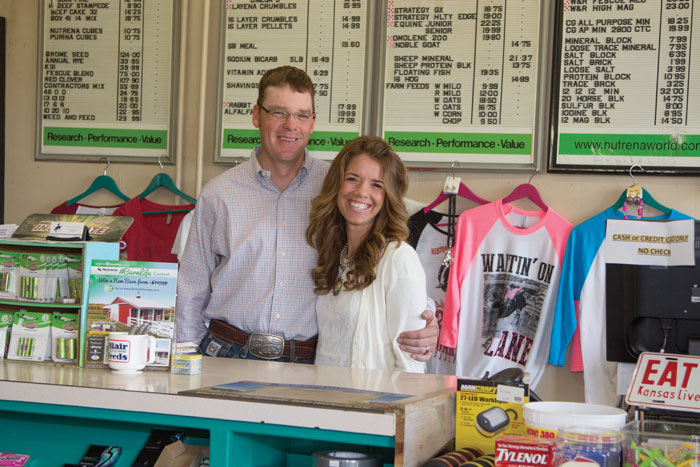
Midland Farm Store
Midland Farm Store, nestled between the railroad and a curve in U.S. Highway 59 north of Lawrence, symbolizes many things to many people: history, community, convenience. But it meant just one thing to Jill and Adam Tregemba when they bought the more than 100-year-old store in 2011: opportunity.
The Tregembas were living in Colorado at the time, and while they didn’t know much about retail, they did know agriculture. Jill grew up on a Wyoming ranch and had worked for the Colorado Livestock Association and Agri-Services Agency. Adam, whose family farmed in Kansas, was a cutting horse trainer.
“We saw this for sale and thought we could make it work,” Jill Tregemba says. “We dove in head first.”
“Customers don’t have to drive very far to find another choice,” Tregemba says. “That makes us be the best we can be customer service-wise and still survive the economics of the thing.”
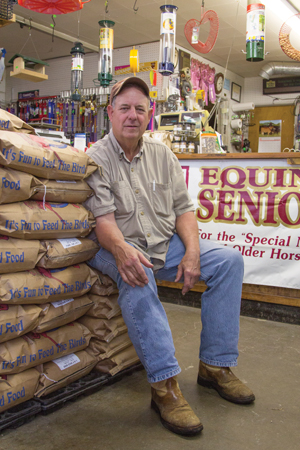
Lawrence Farm & Feed Supply
That Midland has survived at all is a testament to community loyalty. It’s named for the town of Midland, which in the early 1900s was home to a school, blacksmith, train depot, grain elevator, stockyard, restaurant, filling station and church, according to a typed history given to Tregemba by one of her customers.
The two-story clapboard store was built sometime around the turn of the last century and long served as a meeting place for 4-H and other community groups, dance hall and gathering spot for farmers. One of the biggest challenges upon taking over the business, Tregemba “Because our personal life overlaps business life, the people we meet and the things we do definitely help with our business,” Tregemba says.
Much of what Midland offers is what you’d consider traditional ag supplies: bagged and bulk feed, fuel, tools, fencing supplies, livestock panels and waterers, hay and stock trailers, feed bunks and animal health and pet supplies. But they’ve also added things like organic alfalfa hay, holistic dog food, toys, purses, jewelry and gift-wrapping.
Producers still come to meetings on topics like mineral supplements for cattle, and the Tregembas now hold a customer appreciation day in June and partners with suppliers like Purina for other events, such as Chick Days.
The couple moved their two young children and a herd of commercial Angus cattle to a farm outside Lawrence and began renovating the store. Window bars came down, original wood floors were cleaned and oiled, merchandise updated and reorganized and a computerized retail point of sale system installed.
The store’s now performing well, Jill Tregemba says, but she admits it’s not easy. Like agricultural equipment dealerships and other retailers, Midland must balance the needs of suburban and rural customers whose own purchasing behavior is affected by fluctuating market prices, erratic weather cycles and other economic forces. At the same time, it faces stiff competition from the Internet and expanding national chains.
says, was to attract new customers without alienating generations of loyal ones.
“To the community, Midland is theirs,” Tregemba says. “Its ownership might come and go, but Midland is here to stay.”
The Tregembas integrated themselves into that community by supporting 4-H clubs and FFA chapters in Douglas and surrounding counties, the Kansas Livestock Association and the Kansas Beef Council. Tregemba belongs to USD 497’s Agriculture Science Career Pathway Advisory Committee and the current Leadership Lawrence class, while her husband sits on the Leavenworth County Beef Improvement Association board.
“That way we’re not guessing and trying to recreate the wheel,” says Tregemba, who publicized the event on the store’s Facebook page and offered free t-shirts with a $20 purchase, feed drawings and discounts. “That’s where big business meets small business.”
It worked. Midland sold more than 400 chicks during the two-hour event, many of which headed back into Lawrence. Poultry is an increasingly popular suburban hobby, Tregemba says, partly because the city now allows for the keeping of backyard chickens (with certain restrictions). Celebrities like Jennifer Anniston, whose California mansion came with a chicken coop, add to the appeal, as does the customers’ desire to produce more of their own food.
Customers increasingly research their projects online, and then come to the farm store with questions that Midland’s five employees are well-equipped to answer, Tregemba says.
“Our job is to bridge the gap for them and help them weed through what they learned on the Internet and what’s real,” she says.
Roger Tuckel is also adept at closing that gap at his Lawrence Feed & Farm Supply store at the corner of Wisconsin and Sixth streets in town. He bought the business back in 1978, when Douglas County’s 854 farms encompassed 233,924 acres, according to that year’s U.S. Department of Agriculture’s Census of Agriculture.
Most customers at the time were traditional farmers. Then came the farm crisis of the 1980s. Rising interest rates and land prices combined with shrinking export markets and plunging net farm income to drive thousands of American farmers out of business. In subsequent decades, the shift to centralized feedlots and packing plants, confinement hog operations and large dairies transformed those industries.
Throughout it all, the number of traditional feed customers at stores like Tuckel’s dwindled.
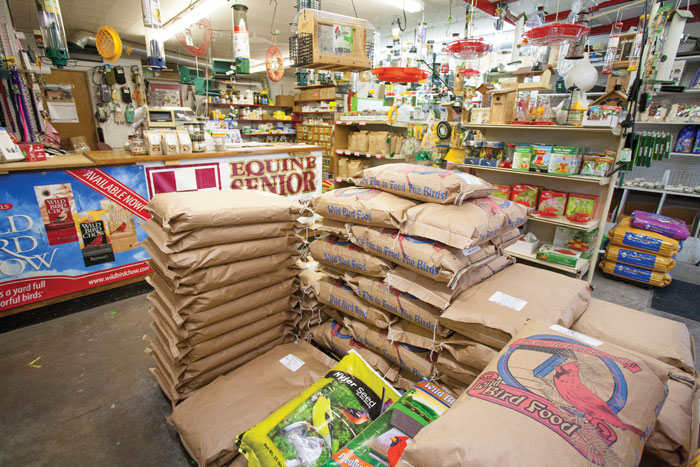
Lawrence Farm & Feed Supply
“So we turned it around from farm to suburban,” says Tuckel, who grew up on a farm outside Lawrence and at one time hauled milk for area dairies. “Dog, cat, horse, lawn and garden—whatever the market was.”
Douglas County’s 945 farms now cover 210,676 acres and generate $43.9 million in agricultural sales, according to the USDA’s 2012 census. Tuckel still sells feed to some of them, and carries formulations for everything from horses, sheep and goats to llamas and guinea pigs. He special orders chicks for customers, sells seed and poultry supplies and stocks a wide range of pet food brands and supplies, including locally made Love Grub Dog Food and Good Dog Biscuits & Treats.
Wild bird supplies are another strong category. The store’s low ceiling is thick with hanging bird feeders, and pallets near the door are stacked with custom seed blends like June’s Wild Bird Mix. The formula for that one was provided by a customer; Tuckel now sells more than 40 25-pound bags of it a week.
Tuckel chats easily with customers about their bees, horses and other projects while his grandson fills seed orders in the back room. Indeed, it’s been a family business since he started. Back then, his mother lent her retail expertise and her best friend kept the books. All of his grown children and many of his dozen grandchildren have worked at the store. There’s even a baby swing near the feedbags in the storeroom for when the littlest grandkids stop in.
Many of his customers, too, have grown up with the store. Kids who once came in with their grandparents now stop by with their own children, providing Tuckel with his most valuable asset—loyal customers.
“We provide good service, and people like that,” Tuckel says. “But you can’t please everybody.”
Certainly, local competition has increased since 2010. That’s when Tractor Supply Co., the country’s biggest rural lifestyle retailer with more than 1,300 stores in 48 states, opened a new store off Kansas Highway 10 east of Lawrence. Orscheln Farm & Home, a privately held company with more than 150 stores in 48 states, expanded its 23rd Street location that same year. TSC did not respond to an interview request; Orscheln declined to comment for this article.
More people compare prices and shop online these days, lured by the promise of no sales tax and overnight shipping. Supporting local stores not only bolsters the local economy, Tuckel says, there’s no substitute for personal service and expertise. And those cheap online prices?
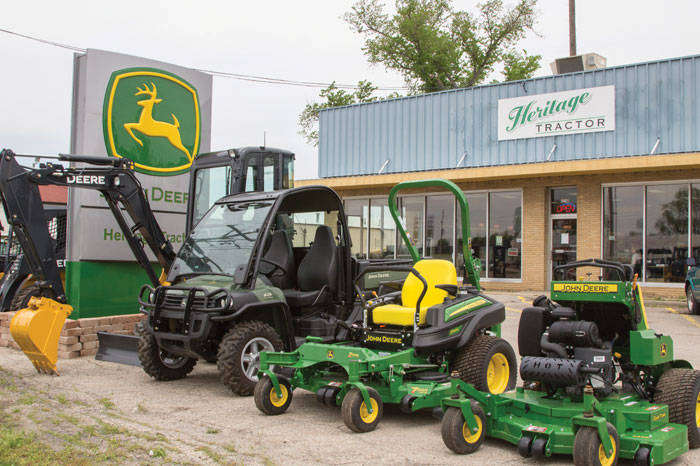
Heritage Tractor
Farm retailers aren’t the only ones adapting to a changing industry. The agricultural equipment business has also been transformed in recent decades, thanks in large part to manufacturer consolidation.
Farmers once had plenty of independent brands to choose from, but a cruise through the parking lot of Shuck Implement Co. on U.S. 59 north of Lawrence show those days are largely gone. There might still be tractors and other machines with the White, New Holland, Massey Ferguson and Hesston logos parked there, but those and other brands are now owned by Agco, a publicly traded global giant based in Georgia. Shuck’s owners did not respond to requests for an interview.
At the same time, equipment makers have pushed dealers to become ever larger in order to more efficiently service customers from a wider geographic area. Certainly that’s been the case at Heritage Tractor, a John Deere dealership near the intersection of Haskell Ave. and 23rd Street in Lawrence.
The company opened its first store in Baldwin City in 1998 and now has 11 locations throughout eastern Kansas and western Missouri. Heritage bought the former Deems Farm Equipment in Lawrence in 2009, and has since grown the business to serve customers throughout Douglas and surrounding counties.
The store carries everything from Traeger grills, Honda generators and Stihl tools to tractors, planters, sprayers, combines and any other equipment a farm might need. There’s a service shop to repair all of that, and a parts counter for customers fixing their own; parts can also be ordered online.
And then there’s what Deere calls precision ag—high tech tools that use GPS and RTK technology to manage water resources or tilling, planting, spraying or harvesting more efficient.
“We want to be a one-stop shop,” says Tim Deneke, Heritage’s location vice president in Lawrence.
Heritage’s Lawrence store generates about half its business from agriculture. The remainder comes from turf management customers and those Deneke refers to as “sundowners,” or people who come home from their full-time jobs and go to work on their yards or farms just as the sun is going down.
That mix helped insulate Heritage during the recent economic downturn, Deneke says. When the ag economy was struggling back around 2000, the overall economy was doing well. When the recession hit around 2007, farm prices were just starting to pick up, and a diverse product line and customer base helped insulate Heritage from the slowdown.
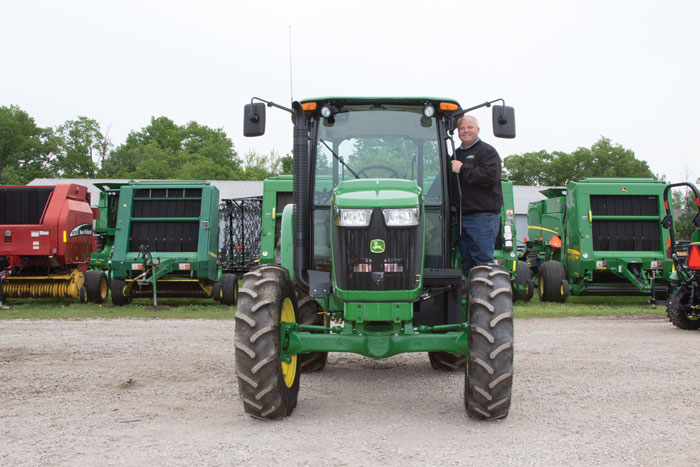
Heritage Tractor
“People were still buying $300,000 combines, but they weren’t buying $300,000 houses,” Deneke says. “
Multiple locations also benefit customers by giving them access to a wider inventory of new and used equipment—big and small—than a single store can carry. It also means Heritage can purchase more bulk oil, net wrap for hay bales and other items at a time. Larger orders translate into lower costs, which the company passes on to customers, Deneke says.
Heritage runs two trucks between stores daily, transferring thousands of parts overnight to better fill customer and service orders. Deere routinely collaborates with its dealerships to identify opportunities such as these, expand service and improve operations.
“This is what Deere wants. This is what they’re pushing for,” he says. “They’re with you hand in hand.”
Customer service is also essential to Heritage’s success, Deneke says. His team is on call 24 hours a day and regularly visits customers’ homes and farms—Deneke himself met his wife while delivering parts to a customer.
“They may call you on Saturday night at 8 o’clock, or Sunday morning at 10,” Deneke says. “If it’s planting season and someone busted a hydraulic hose on their planter, you’ve got to help them out.”
It’s a relationship business, and the customers who stop in regularly to buy parts, oil or filters, or to get advice become like family, he says. Heritage also hosts Drive Green events at Broken Arrow Park, where customers can test drive all sorts of equipment. Santa visits in December, and Heritage participates in the Lawrence Home Show, the Slice of Agriculture at the Douglas County Fairgrounds, 4-H and FFA programs and countless other community events.
It’s good for Lawrence, and good for business.
“It’s part of our job to be part of the community,” Deneke says.

3 Comments
Muchos Gracias for your article.Really thank you! Cool.
Hey, thanks for the blog post.Thanks Again. Really Great.
Добрый день! Хочу рассказатьсвоим опытом о массажных услугах,
которые я в последнее время получил в Landsberg, населённом пункте в Germany.
Меня зовут Gladys, и я давно испытываю
проблемы в мышцах. После долгих поисков я нашёл массажиста, которого действительно можно назвать знатоком
своего дела — Gladys.
С первого сеанса было внушающим доверие.
Офис массажиста уютный, оборудован всем необходимым, играет
фоновая музыка, ароматерапия — всё
способствует расслаблению.
Специалист предложил индивидуальный
подход, подобрал технику, учитывая мои жалобы.
Процедуры включали разные виды массажа — от лечебного
до лимфодренажного. Особенно
помог глубокий массаж мышц, благодаря
которому появилась лёгкость.
После 4–5 посещений я заметил значительное улучшение самочувствия и стал чувствовать себя
бодрее.
Рад, что в Харькове можно найти настоящего специалиста, ведь в таком большом городе много предложений, но не все достойны внимания.
Gladys — тот, кого можно советовать
друзьям и близким. Он не только
понимает строение тела, но и умеет создать комфортную
атмосферу.
Также хочу добавить, что цены на
услуги разумные, а качество на высшем уровне.
Если вы живёте в Харькове и занимаетесь спортом,
рекомендую обязательно пройти
курс у хорошего специалиста.
Благодарю за интересную статью, тема массажа
сегодня как никогда актуальна, и
такие публикации помогают сделать правильный выбор.
my page … массаж для медитации